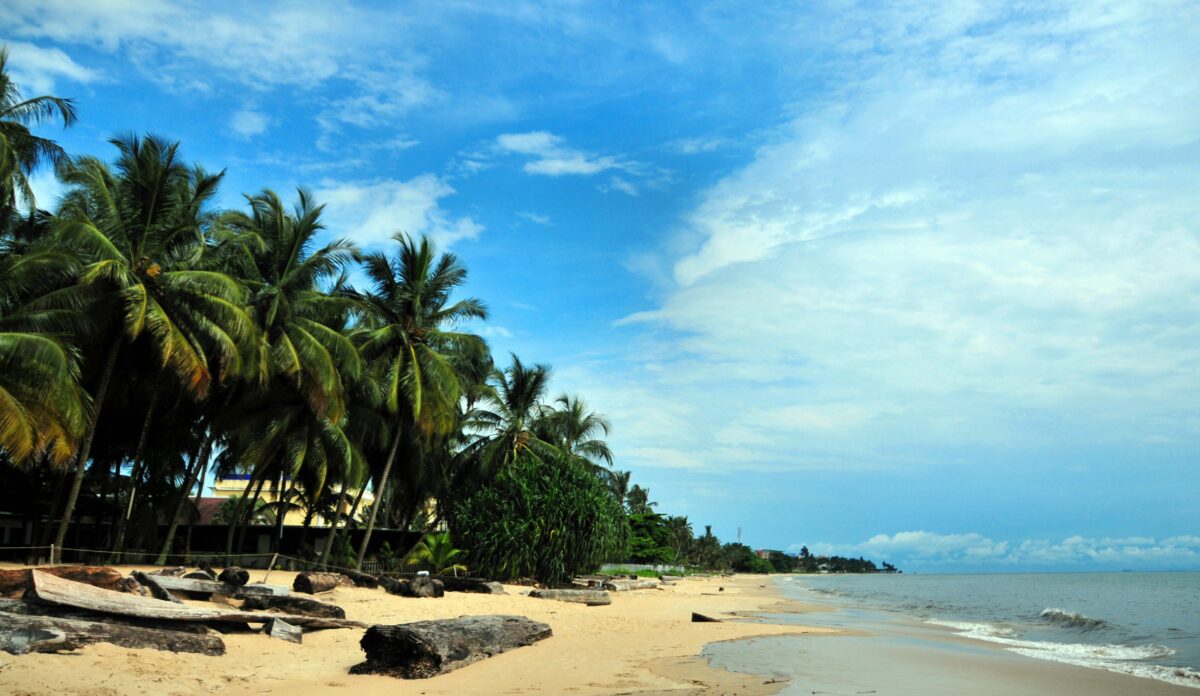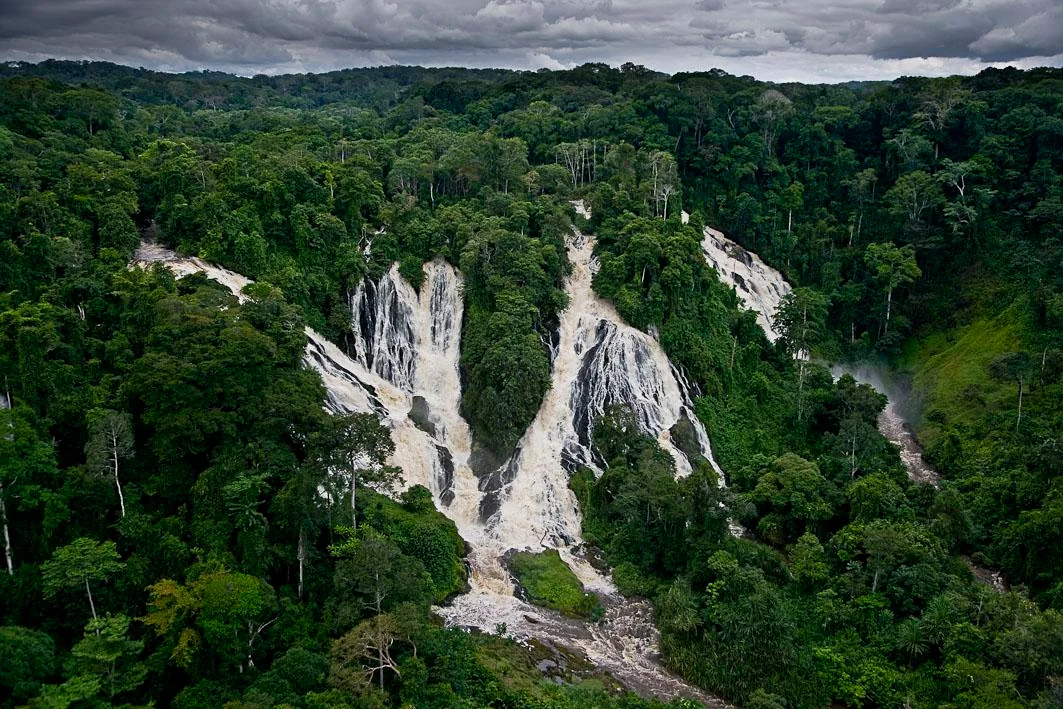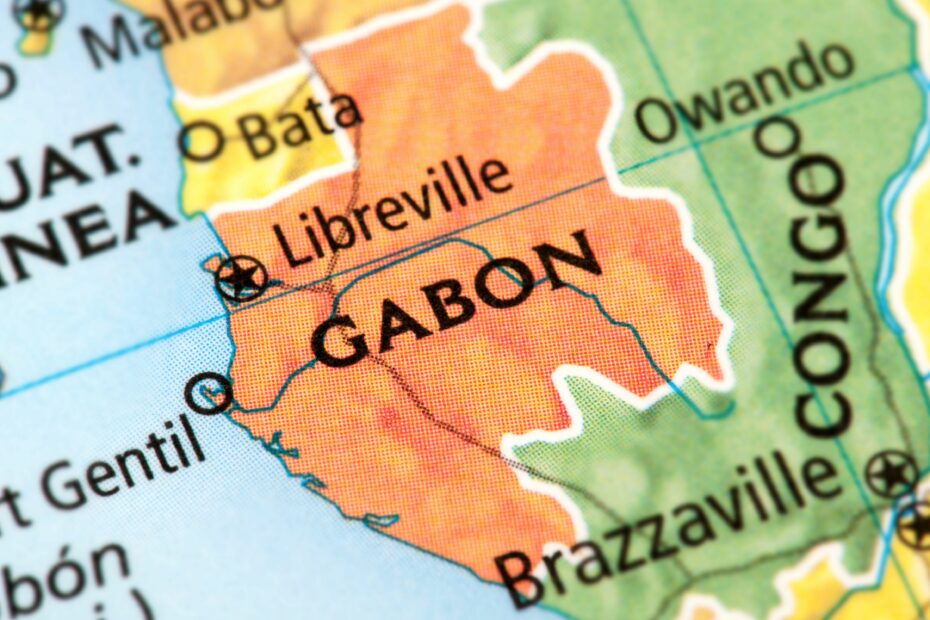One of the French-speaking countries in Africa, Gabon, is a hidden gem in Central Africa’s heart. Blessed with a rich blend of lush rainforests, stunning coastal lagoons, and diverse wildlife, Gabon is a testament to Africa’s beauty. The nation’s cultural heritage, marked by captivating music, art, and traditional ceremonies, further complements its natural allure. Let’s explore the little-known but fascinating country of Gabon.

Geography and Climate
Gabon is blessed with different natural wonders that make up its diverse geography. It is characterized by pristine rainforests, crystal-clear rivers, savannahs, and an extensive coastline with beautiful lagoons. The country’s landscape is adorned with striking natural landmarks, including the awe-inspiring Pongara National Park and the majestic Ogooué River.
As for the climate, Gabon experiences a typical equatorial climate characterized by high humidity and heat throughout the year. The country has two main seasons – a rainy season from October to April and a relatively dry season from May to September. Despite the prevalent humidity, the ocean breezes make coastal regions more tolerable, providing a pleasant respite for locals and tourists alike. Read Also: Exploring the African Diversity: A Glimpse into Each Nation
History
Gabon’s history is intriguing and diverse, tracing back to several centuries. Initially inhabited by Pygmy people, the region witnessed the migration of Bantu groups in the 14th and 15th centuries, who introduced new socio-political structures and economic systems. During the era of European exploration, Gabon was discovered by Portuguese traders in the 15th century, who named it ‘Gabão‘ due to the shape of the Rio de Como estuary, which resembled a cloak or ‘gabão’ in Portuguese.
In the ensuing centuries, Gabon became a prominent hub for the European slave trade, with the Dutch, French, and British establishing their trading posts. The abolition of slavery in the 19th century led to the French asserting their control over the region, and Gabon officially became a part of French Equatorial Africa in 1910.
Gabon gained its independence from France on August 17, 1960, marking a new era in its history. The post-independence period witnessed a series of political changes, with leadership transitioning through various heads of state, contributing to shaping the Gabon of today. Despite the political upheavals, Gabon remained relatively peaceful compared to its neighbors, maintaining steady economic growth largely due to its rich oil reserves and abundant natural resources.

Culture and Traditions
Gabon is a melting pot of diverse ethnic groups with rich cultures and traditions. The largest ethnic group, the Fang, is known for its impressive wooden masks and statues used in religious ceremonies. Music plays a significant role in Gabonese culture, with traditional instruments such as the mouth bow, the balafon (a kind of xylophone), and the ngombi (a type of harp) often played during social gatherings and celebrations.
Gabon’s traditional dance, known as the ‘Bwiti,’‘ is a spiritual ritual practiced by the indigenous people for centuries, believed to connect them with their ancestors. This dance is often accompanied by the consumption of a sacred plant called ‘Iboga,’ known for its hallucinogenic properties, leading to intense spiritual experiences. The Bwiti ceremony is a powerful symbol of Gabon’s cultural resilience, with the practice still being preserved and passed down through generations. Read Also: A journey through Tanzania’s top 7 spectacular national parks
The Gabonese are also known for their warm hospitality and love for football, the nation’s favorite sport. The national football team, known as the ‘Panthers,’ has a passionate fan base, with matches often turning into vibrant displays of national pride. Football is deeply ingrained in Gabonese culture, with many local communities organizing tournaments and competitions.
Food and Cuisine
Beyond the history and culture of Gabon, the country’s food and cuisine also provide a vivid reflection of its rich heritage and biodiversity. Gabonese cuisine is a delectable blend of traditional African flavors heavily reliant on the nation’s natural resources. Staple foods include cassava, plantains, rice, and yams, often served with various sauces and soups. One of the most popular dishes is “Poulet Nyembwe,” chicken cooked in a rich sauce made from palm nuts.

Due to Gabon’s extensive coastline, seafood is a significant part of the diet. Fish like tilapia and capitaine, a species of Nile perch, are commonly consumed, either grilled, smoked, or used in soups. Fruits such as bananas, papayas, pineapples, and various locally grown vegetables are commonly used in salads and side dishes, adding a fresh and vibrant touch to the meals.
Street food culture in Gabon is vibrant and offers an array of snacks, from ‘beignets‘ (fried dough balls) to ‘bouillon d’escargots‘ (snail stew). Let’s not forget the “Poisson Braisé,” a delectable dish of grilled fish seasoned with local spices. Drinks often include palm wine, a traditional alcoholic beverage made from the fermented sap of palm trees.
Gabon’s cuisine offers a gastronomical delight and a way to experience the nation’s history, culture, and love for the land and its produce. Each dish tells a story, making dining in Gabon a truly immersive cultural experience.
Tourism Attractions
Gabon offers many stunning tourist attractions, boasting a unique mix of natural beauty and cultural heritage. Undoubtedly, the crown jewels of Gabon’s tourism are its 13 national parks, protected under the Gabonese National Park Service. These parks, such as the Pongara National Park and the stunning Loango National Park, are home to diverse wildlife, including elephants, gorillas, hippos, and an impressive range of bird species. It’s not uncommon for visitors to have close encounters with these animals, given the parks’ commitment to responsible, low-impact tourism.

The Ivindo National Park, aptly referred to as the ‘Garden of Eden,’ is renowned for its beautiful waterfalls, including Kongou Falls, touted as one of Africa’s most fascinating waterfalls. For the adventurous, the Crystal Mountains offer breathtaking hiking trails adorned with rare orchids and butterflies.
The coastal city of Libreville, Gabon’s capital, is a bustling metropolis with a blend of traditional markets, French colonial buildings, and beautiful beaches. Point Denis, a short boat ride from Libreville, is a stunning peninsula with pristine beaches and resorts.
History buffs will appreciate Lambarene, home to the Albert Schweitzer Hospital, where the Nobel laureate lived and worked. The hospital, now a museum, offers insights into Schweitzer’s humanitarian efforts. Lastly, for a true taste of Gabon’s vibrant cultural life, don’t miss the opportunity to witness a Bwiti ceremony in one of the rural communities.
Economy
Gabon’s economy relies heavily on its oil reserves, with the oil sector accounting for over 80% of the nation’s exports, 45% of the GDP, and 60% of fiscal revenue. However, in recent years, the Gabonese government has been making significant efforts to diversify the economy, reducing its dependence on oil and focusing on sectors like timber processing, mining, and agriculture.
Gabon’s mineral industry is a key player, with rich manganese and iron deposits. The country is known as the world’s second-largest manganese producer. There are also sizable untapped deposits of uranium, gold, and phosphates. The government embarked on a strategy to attract foreign direct investment into the mining sector to tap into these resources further.
Although not fully exploited, the agricultural sector in Gabon offers significant potential for growth and diversification. Key agricultural products include cocoa, coffee, palm oil, and rubber. Gabon is home to an extensive rainforest, and the timber industry has traditionally been strong, with initiatives in place for sustainable and certified logging practices.
Moreover, Gabon’s tourism sector exhibits immense potential for economic development. The nation’s commitment to conservation demonstrated through the establishment of numerous national parks, offers a unique opportunity for eco-tourism. The government has made concerted efforts to boost tourism, including investment in tourism infrastructure and marketing the country’s natural beauty to international tourists.
In recent years, Gabon has also invested in infrastructure projects and the digital economy, aiming to transform itself into a regional trade hub. The government’s “Gabon Emergent” strategic plan outlines a vision for achieving emerging economy status by 2025 through economic diversification and attracting foreign investment. However, the plan’s implementation faces challenges due to low oil prices, a lack of diversification, and governance issues.
Bottom Line
As Gabon continues to develop and promote its natural and cultural treasures, it is an example of Africa’s unspoiled landscapes and experience the warmth and hospitality of its people. The country’s cuisine, tourism attractions, and efforts towards economic diversification make it an exciting destination for tourists and investors alike.



